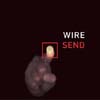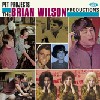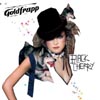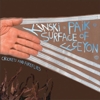 Sorry to be the bearer of brutal truth yet again, but here goes: noiseis boring. No other known genre consists of nearly the number ofcompletely talentless assholes as noise does—not even metal! Full ofextreme tedium and seemingly unyielding emulation, the music's onlysalvation apparently comes in the form of the "originators" and the"permutators." Originators like Masami Akita (known best as Merzbow)planted the seeds and populated the genre. His own prolific outputyielded countless clones worldwide, all the while passing them bythrough revolution of medium and delivery systems as well as sound(recall the infamous car installation or the 18 CD rubber boxset).While far from innocent of releasing a significant number of unexcitingalbums over the years, Akita regularly ups the ante just enough to stayrelevant in a time where there are more useless players than ever. Satanstornade,his collaborative project with Mego artist and "permutator" RussellHaswell, is one of those releases that will keep him from fading intorelic status. Composed exclusively on two Powerbooks with unnamed,various software programs, this album celebrates the relativelyuntapped digital realm of noise. Recorded live to MiniDisc, these fourtracks show two men duking it out in anonymity, pummeling eardrums andsquealing electronically over the course of 48 viscious minutes. Thoughsonically similar, the compositions make for an interesting, albeitdifficult, listening experience. I strongly recommend giving the albuma nonstop listen to achieve the full effect. So while countlessjerkoffs continue in their attempts to recycle Music For Bondage Performance ad nauseum, Akita and Haswell successfully resuscitate the terminal patient known as noise with this blistering workout.
Sorry to be the bearer of brutal truth yet again, but here goes: noiseis boring. No other known genre consists of nearly the number ofcompletely talentless assholes as noise does—not even metal! Full ofextreme tedium and seemingly unyielding emulation, the music's onlysalvation apparently comes in the form of the "originators" and the"permutators." Originators like Masami Akita (known best as Merzbow)planted the seeds and populated the genre. His own prolific outputyielded countless clones worldwide, all the while passing them bythrough revolution of medium and delivery systems as well as sound(recall the infamous car installation or the 18 CD rubber boxset).While far from innocent of releasing a significant number of unexcitingalbums over the years, Akita regularly ups the ante just enough to stayrelevant in a time where there are more useless players than ever. Satanstornade,his collaborative project with Mego artist and "permutator" RussellHaswell, is one of those releases that will keep him from fading intorelic status. Composed exclusively on two Powerbooks with unnamed,various software programs, this album celebrates the relativelyuntapped digital realm of noise. Recorded live to MiniDisc, these fourtracks show two men duking it out in anonymity, pummeling eardrums andsquealing electronically over the course of 48 viscious minutes. Thoughsonically similar, the compositions make for an interesting, albeitdifficult, listening experience. I strongly recommend giving the albuma nonstop listen to achieve the full effect. So while countlessjerkoffs continue in their attempts to recycle Music For Bondage Performance ad nauseum, Akita and Haswell successfully resuscitate the terminal patient known as noise with this blistering workout.
Look up Music for gazing upwards brought to you by Meat Beat Manifesto & scott crow, +/-, Aurora Borealis, The Veldt, Not Waving & Romance, W.A.T., The Handover, Abul Mogard & Rafael Anton Irisarri, Mulatu Astatke, Paul St. Hilaire & René Löwe, Songs: Ohia, and Shellac. Aurora Borealis image from California by Steve. Get involved: subscribe, review, rate, share with your friends, send images! |



 It has never been more clear that David Tibet lives in a completely idiosyncratic sphere of his own. Perhaps this is true for everyone, but Tibet's world seems particularly out of step with current trends in music, culture and thought. There is something terribly admirable and beguiling about that. Hypnagogue beautifully proves that Current 93 is continuing in its tangential orbit, and exists solely as the outlet for Tibet's poetic musings on Christ, cats, children, dreams, piety, horror, death, dread, decay and apocalypse. You're not going to find any concessions to glitch-pop or retro-electro here.
It has never been more clear that David Tibet lives in a completely idiosyncratic sphere of his own. Perhaps this is true for everyone, but Tibet's world seems particularly out of step with current trends in music, culture and thought. There is something terribly admirable and beguiling about that. Hypnagogue beautifully proves that Current 93 is continuing in its tangential orbit, and exists solely as the outlet for Tibet's poetic musings on Christ, cats, children, dreams, piety, horror, death, dread, decay and apocalypse. You're not going to find any concessions to glitch-pop or retro-electro here. If a keyboard cowboy steals your voice it might just serve your server right for trying to read and burn the last of the Mohicans. With one foul swoop Colin Newman proclaims punk rock meaningless and declares the joy of his latest bastard 'heavy metal dancefloor' bad vibing it up like there's no tomorrow. Those four negative horsemen Wire celebrate the art of stopping, which is where it's at - addictive repetitive mega-riffing retooled on hardrive and nailed down fast in paranoiac fits.
If a keyboard cowboy steals your voice it might just serve your server right for trying to read and burn the last of the Mohicans. With one foul swoop Colin Newman proclaims punk rock meaningless and declares the joy of his latest bastard 'heavy metal dancefloor' bad vibing it up like there's no tomorrow. Those four negative horsemen Wire celebrate the art of stopping, which is where it's at - addictive repetitive mega-riffing retooled on hardrive and nailed down fast in paranoiac fits. The straight-ahead pop music on this German trio's self-titled secondrelease tends to be based on the instrumentation of bass, drums, guitarand vocals with a leaning towards some electronic augmentation.Although the presence of synthesizer can be fairly liberal at timeswith a hint of drum machine, there's no great risk of it being overusedas it always seems appropriate within the context. Their choices ofcertain chordal intervals paired with obvious guitar and synth patchesat times remind me of some of the more mainstream British bands of the80s, which is a good thing. "Untem im Strom" leads off the disc with achoppy, jangly guitar progression matched with vocals that sneaks inthe rhythm section on the upbeat to steadily drive the tune through itsmarked sections. Of the disc's ten tracks, the dance-pulsed, graduallyrocking "Tremble" would be the only one sung entirely in English withthe remainder mostly in the group's native tongue. The cadence of thevocal delivery for some numbers feels a bit awkward at first until themelody becomes the focal point and the music settles in around it. Thewhispy vocals, strummy acoustic guitar and plucked bass of "Hannover"is lead by a steady, puffy-snared drum machine while mild pianoflourishes and buzzing slide guitar trickle throughout. "Stop" thrashesalong to bursts of siren keyboards, pounding tom-toms and dirty basswhich shift from jagged to slick and back again within the span of itsseventy-five seconds. Go Plus' musicianship is solid and theirsongwriting style is fairly consistent from track to track with somefairly cool progressions and hooks. For the most part, these keyelements are underused but there are some worthwhile moments.
The straight-ahead pop music on this German trio's self-titled secondrelease tends to be based on the instrumentation of bass, drums, guitarand vocals with a leaning towards some electronic augmentation.Although the presence of synthesizer can be fairly liberal at timeswith a hint of drum machine, there's no great risk of it being overusedas it always seems appropriate within the context. Their choices ofcertain chordal intervals paired with obvious guitar and synth patchesat times remind me of some of the more mainstream British bands of the80s, which is a good thing. "Untem im Strom" leads off the disc with achoppy, jangly guitar progression matched with vocals that sneaks inthe rhythm section on the upbeat to steadily drive the tune through itsmarked sections. Of the disc's ten tracks, the dance-pulsed, graduallyrocking "Tremble" would be the only one sung entirely in English withthe remainder mostly in the group's native tongue. The cadence of thevocal delivery for some numbers feels a bit awkward at first until themelody becomes the focal point and the music settles in around it. Thewhispy vocals, strummy acoustic guitar and plucked bass of "Hannover"is lead by a steady, puffy-snared drum machine while mild pianoflourishes and buzzing slide guitar trickle throughout. "Stop" thrashesalong to bursts of siren keyboards, pounding tom-toms and dirty basswhich shift from jagged to slick and back again within the span of itsseventy-five seconds. Go Plus' musicianship is solid and theirsongwriting style is fairly consistent from track to track with somefairly cool progressions and hooks. For the most part, these keyelements are underused but there are some worthwhile moments. Hordes of NYC hipsters already know that the "mutant disco" punk/dancehybrid sound of the early 80's is experiencing a major resurgence ofinterest. The original heroes of the genre—bands like Liquid Liquid, 23Skidoo, A Certain Ratio, and Gang of Four—are being excavated andre-released. Inevitably, a legion of new artists are having a lot offun rediscovering these sounds and making their own form of retrodance/punk, with uneven results. Trevor Jackson's Output Recordings,home to a cadre of retro-disco and new-new-wave artists, have jumped onthis bandwagon in a big way. Trying to make their own 21st centuryversion of the seminal Disco not Disco compilation, Output has assembled some of the best songs and 12" mixes on the label for their Channel 2comp. The disc opens with 7 Hurtz' "Malibu," a shimmering retro-housetrack which tries (and fails) to sound like FPU's "Ocean Drive."Manhead's "Doop" is a fantastically corny bebop jazz-disco hybrid thatrecalls Miles Davis' ill-advised foray into dance and hiphop.Blackstrobe's dancefloor-stormer "Me and Madonna" is on the verge ofsounding like Gina X Performance's "Nice Mover," but eventuallydeclines into electroclash cliches. Possibly the best reason to buythis compilation is the only appearance of LCD Soundsystem's "Losing MyEdge" on CD. For those who don't already know, "Losing My Edge" is thefunniest, most infectious 12" dance single to be released in recentmemory. Over retardedly low-fi beatbox and bass hits, the DFA's JamesMurphy does a Mark E. Smith-style monologue boasting all of his hipstercredentials: he was there at the first Can show, he was there at theParadise Garage with Larry Levan, he was the first to play Daft Punk atCBGB's. At the end of the song, he yells out a hilarious roll-call ofevery so-called "hip" artist from the past thirty years: "This Heat,Pere Ubu, The Human League, The Normal, Lou Reed..." and etc. adnauseum. By removing the minor-key bassline andupping the disco quotient for their 12" re-recording of "Olio," NYCpunk-disco band The Rapture manage to sound a little less like The Curethan the song's first appearance on their debut Mirror. TheZongamin remix of Playgroup's underground dance hit "Make it Happen" isawesome, pushing the intensely rhythmic ESG-style sassiness that theoriginal only hinted at. Dempsey's "ODB on the Run" is a chaoticallyfunny avant-dance track about Big Baby Jesus' run-in with the law andthe disc ends with a weirdly out-of-place, laptop-treated guitar balladby The Boy Lucas. Like most compilations of this sort, this is aninconsistent listen with a few gems that may or may not be worth theprice.
Hordes of NYC hipsters already know that the "mutant disco" punk/dancehybrid sound of the early 80's is experiencing a major resurgence ofinterest. The original heroes of the genre—bands like Liquid Liquid, 23Skidoo, A Certain Ratio, and Gang of Four—are being excavated andre-released. Inevitably, a legion of new artists are having a lot offun rediscovering these sounds and making their own form of retrodance/punk, with uneven results. Trevor Jackson's Output Recordings,home to a cadre of retro-disco and new-new-wave artists, have jumped onthis bandwagon in a big way. Trying to make their own 21st centuryversion of the seminal Disco not Disco compilation, Output has assembled some of the best songs and 12" mixes on the label for their Channel 2comp. The disc opens with 7 Hurtz' "Malibu," a shimmering retro-housetrack which tries (and fails) to sound like FPU's "Ocean Drive."Manhead's "Doop" is a fantastically corny bebop jazz-disco hybrid thatrecalls Miles Davis' ill-advised foray into dance and hiphop.Blackstrobe's dancefloor-stormer "Me and Madonna" is on the verge ofsounding like Gina X Performance's "Nice Mover," but eventuallydeclines into electroclash cliches. Possibly the best reason to buythis compilation is the only appearance of LCD Soundsystem's "Losing MyEdge" on CD. For those who don't already know, "Losing My Edge" is thefunniest, most infectious 12" dance single to be released in recentmemory. Over retardedly low-fi beatbox and bass hits, the DFA's JamesMurphy does a Mark E. Smith-style monologue boasting all of his hipstercredentials: he was there at the first Can show, he was there at theParadise Garage with Larry Levan, he was the first to play Daft Punk atCBGB's. At the end of the song, he yells out a hilarious roll-call ofevery so-called "hip" artist from the past thirty years: "This Heat,Pere Ubu, The Human League, The Normal, Lou Reed..." and etc. adnauseum. By removing the minor-key bassline andupping the disco quotient for their 12" re-recording of "Olio," NYCpunk-disco band The Rapture manage to sound a little less like The Curethan the song's first appearance on their debut Mirror. TheZongamin remix of Playgroup's underground dance hit "Make it Happen" isawesome, pushing the intensely rhythmic ESG-style sassiness that theoriginal only hinted at. Dempsey's "ODB on the Run" is a chaoticallyfunny avant-dance track about Big Baby Jesus' run-in with the law andthe disc ends with a weirdly out-of-place, laptop-treated guitar balladby The Boy Lucas. Like most compilations of this sort, this is aninconsistent listen with a few gems that may or may not be worth theprice. I am definitely and unashamedly one of the legion of obsessive fans ofBrian Wilson. I wholeheartedly agree with all of the critics who nevertire of declaring Wilson a genius of pop songcraft and production. Ihave faithfully collected all the prime Beach Boys material—LPreissues, box sets, 45s, live albums, bootlegs, "Best Of" albums, etc.To my already absurd Wilson collection, I can now add this interestingarchival disc, recently released by Ace Records of London. Ace Recordsis a label for music collectors and junkies, specializing inre-releases of forgotten rock n' roll treasures and lost musicalexotica from the 18's and 60's. This disc may be their mostirresistable release yet, as it is the first to compile all of thenon-Beach Boys material produced by Brian Wilson in his sixties heyday.Someone has obviously gone to a lot of trouble to track down all thoserare 45s and lesser-known one-off projects. As an archival compilation,Pet Projectsis unparalleled. As a listening experience, however, the disc issomewhat more problematic. It is a pure pleasure to hear the first twotracks, a pair of Phil Spector-influenced teenage symphonies performedby Sharon Marie, a girlfriend of Beach Boy Mike Love. Wilson and Love'smediocre ballads are transformed by Brian's studio genius intoover-the-top orchestral blowouts, matching (and often exceeding) thebar set by Spector, Brian's hero and a huge influence on the evolutionof his studio sound. It's hard to remember that forty years before hestarted murdering B-movie actresses, Phil Spector was the innovator ofstudio-created, multi-layered pop masterpieces that influenced ageneration of producers. Spector and Wilson became the first "star"producers—their production genius was recognized as the primary elementof the music, more important than the song or the singer. Wilson andthree of his friends called themselves The Survivors, and cut a one-offsingle "Pamela Jean" with the instrumental b-side "After the Game." Thea-side recalls the classic Beach Boys sound of "Help Me, Rhonda," butthe b-side is an early preview of the complex, emotive instrumentaltracks that Brian would write and produce for Pet Sounds a couple yearslater. There is also a glimpse here of Brian Wilson, the acid casualty:Dean Torrance (of surf-pop duo Jan & Dean), using the fictitiousband name The Lauging Gravy, recorded a version of Brian's psychedelicbarbershop quartet song "Vegetables," originally recorded for thenever-completed Smile. The song sounds just as bizarre here as on the numerous Smilebootlegs. The rest of the disc is dominated by 45s released by Wilson'sgirl groups The Honeys, Rachel and the Revolvers and American Spring.Although most of these groups are long-forgotten for good reasons,there is a naive charm and excitement to songs like "Pray for Surf" and"He's a Doll" that recall everything that is wonderful and beguilingabout the girl groups of the early sixties. These songs would not beout of place on Music for Pussycats (the Boyd Rice-compiled love-letter to girl-group pop). Pet Projects is a unique, if somewhat frustrating, look back at the "lost" treasures of one of pop music's most fascinating talents.
I am definitely and unashamedly one of the legion of obsessive fans ofBrian Wilson. I wholeheartedly agree with all of the critics who nevertire of declaring Wilson a genius of pop songcraft and production. Ihave faithfully collected all the prime Beach Boys material—LPreissues, box sets, 45s, live albums, bootlegs, "Best Of" albums, etc.To my already absurd Wilson collection, I can now add this interestingarchival disc, recently released by Ace Records of London. Ace Recordsis a label for music collectors and junkies, specializing inre-releases of forgotten rock n' roll treasures and lost musicalexotica from the 18's and 60's. This disc may be their mostirresistable release yet, as it is the first to compile all of thenon-Beach Boys material produced by Brian Wilson in his sixties heyday.Someone has obviously gone to a lot of trouble to track down all thoserare 45s and lesser-known one-off projects. As an archival compilation,Pet Projectsis unparalleled. As a listening experience, however, the disc issomewhat more problematic. It is a pure pleasure to hear the first twotracks, a pair of Phil Spector-influenced teenage symphonies performedby Sharon Marie, a girlfriend of Beach Boy Mike Love. Wilson and Love'smediocre ballads are transformed by Brian's studio genius intoover-the-top orchestral blowouts, matching (and often exceeding) thebar set by Spector, Brian's hero and a huge influence on the evolutionof his studio sound. It's hard to remember that forty years before hestarted murdering B-movie actresses, Phil Spector was the innovator ofstudio-created, multi-layered pop masterpieces that influenced ageneration of producers. Spector and Wilson became the first "star"producers—their production genius was recognized as the primary elementof the music, more important than the song or the singer. Wilson andthree of his friends called themselves The Survivors, and cut a one-offsingle "Pamela Jean" with the instrumental b-side "After the Game." Thea-side recalls the classic Beach Boys sound of "Help Me, Rhonda," butthe b-side is an early preview of the complex, emotive instrumentaltracks that Brian would write and produce for Pet Sounds a couple yearslater. There is also a glimpse here of Brian Wilson, the acid casualty:Dean Torrance (of surf-pop duo Jan & Dean), using the fictitiousband name The Lauging Gravy, recorded a version of Brian's psychedelicbarbershop quartet song "Vegetables," originally recorded for thenever-completed Smile. The song sounds just as bizarre here as on the numerous Smilebootlegs. The rest of the disc is dominated by 45s released by Wilson'sgirl groups The Honeys, Rachel and the Revolvers and American Spring.Although most of these groups are long-forgotten for good reasons,there is a naive charm and excitement to songs like "Pray for Surf" and"He's a Doll" that recall everything that is wonderful and beguilingabout the girl groups of the early sixties. These songs would not beout of place on Music for Pussycats (the Boyd Rice-compiled love-letter to girl-group pop). Pet Projects is a unique, if somewhat frustrating, look back at the "lost" treasures of one of pop music's most fascinating talents.  The many styles of Jon DeRosa are on full display these days, with new albums from Pale Horse and Rider and this project being released so close to each other. Where DeRosa is getting a lot of press these days for PHaR, it is Aarktica that started his journey into somber melodies, though for his latest, it seems the more song-like structure of the former informs the latter. Pure Tone Audiometryrefers to a hearing test that DeRosa had when he lost the hearing in his right ear several years ago. It is also the most rock-oriented of DeRosa's releases. Where previous Aarktica recordings were primarily drone and buzz, and PHaR very acoustic and downbeat, this music is full-sounding, almost playful in places, and very mapped-out. Sounds appear and disappear, spliced in and out with the skill of a surgeon, and everything dances around your ears like it was born to be there. The chilling vocals on the opening track almost drown out the science film wild track, and altogether it sounds like a chorus of technology, humanity, and the otherworldly. Elsewhere, the electro-pop returns, with electric guitar, programmed beats, and the sullen but liquid voice of DeRosa gracing the other tones. Then, real drums snap into focus, and the sound of a full band, something unheard of Aarktica releases, fills the speakers and pulses with raw energy. The harmony chorus vocals all over the record breathe real life into this material, so much so that it alone almost eclipses all his other work. This is not to say that DeRosa has left behind his old devices, as"Snowstorm Ruins Birthday" and "Water Wakes Dead Cells" clearly display. He has, however, found a growth, a leap forward, that was not expected, but certainly most welcome.
The many styles of Jon DeRosa are on full display these days, with new albums from Pale Horse and Rider and this project being released so close to each other. Where DeRosa is getting a lot of press these days for PHaR, it is Aarktica that started his journey into somber melodies, though for his latest, it seems the more song-like structure of the former informs the latter. Pure Tone Audiometryrefers to a hearing test that DeRosa had when he lost the hearing in his right ear several years ago. It is also the most rock-oriented of DeRosa's releases. Where previous Aarktica recordings were primarily drone and buzz, and PHaR very acoustic and downbeat, this music is full-sounding, almost playful in places, and very mapped-out. Sounds appear and disappear, spliced in and out with the skill of a surgeon, and everything dances around your ears like it was born to be there. The chilling vocals on the opening track almost drown out the science film wild track, and altogether it sounds like a chorus of technology, humanity, and the otherworldly. Elsewhere, the electro-pop returns, with electric guitar, programmed beats, and the sullen but liquid voice of DeRosa gracing the other tones. Then, real drums snap into focus, and the sound of a full band, something unheard of Aarktica releases, fills the speakers and pulses with raw energy. The harmony chorus vocals all over the record breathe real life into this material, so much so that it alone almost eclipses all his other work. This is not to say that DeRosa has left behind his old devices, as"Snowstorm Ruins Birthday" and "Water Wakes Dead Cells" clearly display. He has, however, found a growth, a leap forward, that was not expected, but certainly most welcome. When I learned several months ago that Goldfrapp's forthcoming second album was to be titled Black Cherry,my first thought was how fitting of a title it would be. After fallingin love with the sweet, dark, succulent meoldies on their outstandingdebut, Felt Mountain, I anticipated hearing what the band hadbeen up to in the studio for the past two and a half years. It seemsthat in the interim, Alison Goldfrapp and Will Gregory have largelychanged their style. Straying from the moody, cinematic quality oftheir previous record, Black Cherry is a synth-driven,erotically-charged collection of songs combining Giorgio Moroder, Add Nto [X] and Olivia Newton-John circa 1979. Even Alison herself hasundergone a makeover: gone are the Heidi braids and muddy rubberboots—the eye-catching photo of her inside the sleeve reflects a crossbetween Elegant Gothic Lolita and Dorothy of Kansas.
When I learned several months ago that Goldfrapp's forthcoming second album was to be titled Black Cherry,my first thought was how fitting of a title it would be. After fallingin love with the sweet, dark, succulent meoldies on their outstandingdebut, Felt Mountain, I anticipated hearing what the band hadbeen up to in the studio for the past two and a half years. It seemsthat in the interim, Alison Goldfrapp and Will Gregory have largelychanged their style. Straying from the moody, cinematic quality oftheir previous record, Black Cherry is a synth-driven,erotically-charged collection of songs combining Giorgio Moroder, Add Nto [X] and Olivia Newton-John circa 1979. Even Alison herself hasundergone a makeover: gone are the Heidi braids and muddy rubberboots—the eye-catching photo of her inside the sleeve reflects a crossbetween Elegant Gothic Lolita and Dorothy of Kansas. Part two in The Music Fellowship Triptychs series finds more of thesame beautiful instrumental noise rock, just from different talents.Kinski, Paik, and Surface of Eceyon have all gained acclaim for theirindividual and unique contributions to the drone rock landscape, thatis becoming more of a pastiche these days. All the groups havedifferent sounds when listened to separately, but together, as they arein this series, they tend to sound very much the same. This is notnecessarily a mark against them, however, as the more the music has thesame organic feel and structure, the more it comes off as a cohesiverelease and therefore more palatable. All three bands have newfull-length records coming out on separate labels later in the year,and if this EP is any indication those records could level a city. Onthe cleverly-titled "Keep Clear of Me, I Am Maneuvering WithDifficulty," Kinski continues with their typical sonic explorations,this time in one track with three separate movements. Completelyimprovised, the music blends nicely into each piece, slowly building tostart, then unleashing in a crushing rhythm and a bleeding, wailingdistortion of guitars. It annoys successfully, even while it impresses,then fades out in a lovely buzz and tremble meld of organ and synthsounds, as if the song wants to give your ears a salve. Paik doesn'twade in at all, just menaces with a brooding bassline and feedback.Echoed guitars join to up the noise factor, and then the hammer fallswith the measured persistence of the drums. Paik's second song, "Eva,"is lighter in tone, but a well-crafted selection that leads well intothe music of Surface of Eceyon. With no explanation as to the slightchange in their name (nor an explanation as to why both spellingsappear in the booklet), this brave collaboration between members ofLanding and Yume Bitsu with Phil Jenkins gives a taste of theirconception in their composition. "Concert of Stars" was recorded duringone of the band's early sessions together, though it sounds like anevolution of sound. Pure improvisation from the vessyl informs theirinstruments and minds to create a thirty-minute opus of ambient beauty.It certainly bears an appropriate name, too, as I could easily enjoy avisit to the planetarium if this was the soundtrack. This second partof the Tryyptych Series rivals the first and is worth a concentratedlisten, even if some of the music is better absorbed then heard.
Part two in The Music Fellowship Triptychs series finds more of thesame beautiful instrumental noise rock, just from different talents.Kinski, Paik, and Surface of Eceyon have all gained acclaim for theirindividual and unique contributions to the drone rock landscape, thatis becoming more of a pastiche these days. All the groups havedifferent sounds when listened to separately, but together, as they arein this series, they tend to sound very much the same. This is notnecessarily a mark against them, however, as the more the music has thesame organic feel and structure, the more it comes off as a cohesiverelease and therefore more palatable. All three bands have newfull-length records coming out on separate labels later in the year,and if this EP is any indication those records could level a city. Onthe cleverly-titled "Keep Clear of Me, I Am Maneuvering WithDifficulty," Kinski continues with their typical sonic explorations,this time in one track with three separate movements. Completelyimprovised, the music blends nicely into each piece, slowly building tostart, then unleashing in a crushing rhythm and a bleeding, wailingdistortion of guitars. It annoys successfully, even while it impresses,then fades out in a lovely buzz and tremble meld of organ and synthsounds, as if the song wants to give your ears a salve. Paik doesn'twade in at all, just menaces with a brooding bassline and feedback.Echoed guitars join to up the noise factor, and then the hammer fallswith the measured persistence of the drums. Paik's second song, "Eva,"is lighter in tone, but a well-crafted selection that leads well intothe music of Surface of Eceyon. With no explanation as to the slightchange in their name (nor an explanation as to why both spellingsappear in the booklet), this brave collaboration between members ofLanding and Yume Bitsu with Phil Jenkins gives a taste of theirconception in their composition. "Concert of Stars" was recorded duringone of the band's early sessions together, though it sounds like anevolution of sound. Pure improvisation from the vessyl informs theirinstruments and minds to create a thirty-minute opus of ambient beauty.It certainly bears an appropriate name, too, as I could easily enjoy avisit to the planetarium if this was the soundtrack. This second partof the Tryyptych Series rivals the first and is worth a concentratedlisten, even if some of the music is better absorbed then heard.
